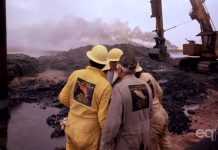Climate change is a real and present danger to our planet, and its effects are being felt globally. The consequences of unchecked global warming could be catastrophic. As a result, some scientists and engineers are proposing radical and large-scale ideas that could potentially save us from disaster. Although these ideas might have unknown side effects, some scientists believe we may soon have no choice but to put these radical and controversial plans into action.
The first three proposed ideas featured in the film look at reducing the power of the sun, thereby cooling the planet. Professor Roger Angel from Arizona, the designer of the world’s largest telescope, is proposing to put a giant glass sunshade in space. The sunshade will deflect a small percentage of the sun’s rays back into space, reducing the amount of heat that reaches the earth’s surface.
Dutch Professor Paul Crutzen, who won the Nobel Prize for chemistry, is proposing to fire hundreds of rockets loaded with tons of sulphur into the stratosphere, creating a vast but very thin sunscreen of sulphur around the earth. This would have the effect of reducing the amount of heat that reaches the earth’s surface and could potentially offset the effects of global warming.
British atmospheric physicist Professor John Latham and engineer Stephen Salter have designed a fleet of remote-controlled yachts that will pump fine particles of sea water into the clouds, increasing the thickness of the clouds and reflecting the sun’s rays. This would also have the effect of reducing the amount of heat that reaches the earth’s surface.
The other two proposals aim to tackle the problem of excess carbon dioxide, the cause of global warming. Sydney engineer Professor Ian Jones proposes to feed plankton with gallons of fertilizer. This will make the plankton grow and absorb carbon dioxide from the air. New York-based Professor Klaus Lackner has designed a carbon dioxide capturing machine and his plan is to locate more of them across the globe. They would suck in carbon dioxide, turn it into a powder, and bury it deep under the ocean in disused oil or gas fields.
Most of the scientists are reluctant advocates of these ideas, and all believe we should be cutting down on our use of fossil fuels to heat our homes and drive our cars. But is time running out for planet earth? The film poses this question, leaving the viewer to ponder the potential risks and benefits of these radical proposals.
As we grapple with the issue of climate change, it is essential to consider all possible solutions, even the most radical and controversial ones. We must remember that the consequences of inaction could be far worse than the risks associated with implementing these proposals. It is time to start thinking outside the box and take bold steps to save our planet.

































